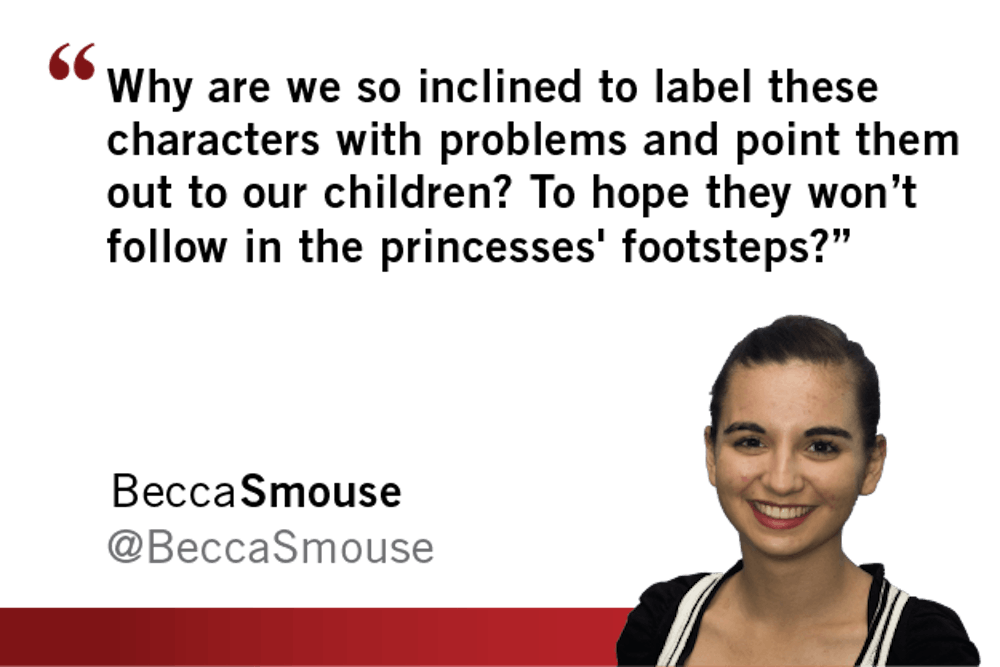While supporters of the feminist movement continue to spread their message, recently through viral videos, some are taking inappropriate and distasteful stabs at Disney classics.
Devorah Blachor of the New York Times wrote in a blog post titled "Turn Your Princess-Obsessed Toddler Into a Feminist in Eight Easy Steps":
"Make a list of wishes your daughter might ask to be granted from her fairy godmother. When the list is completed, tap your daughter’s forehead gently and then say excitedly: 'I found your fairy godmother! It’s your brain, and she’s been right here all along!'"The list goes on and on to describe how to bring up conversations with toddlers about women’s rights through the mistakes and misfortune of princesses found in the films. Watching these films is not the time nor the place to bring up issues of Stockholm syndrome or the “patriarchal shenanigans of King Triton."
 Yes, it is popular, and very easy, to point out the hundreds of flaws in the Disney films we grew up loving. But we didn’t see these flaws as children; we didn’t sit back and watch in disgust when were young.
Yes, it is popular, and very easy, to point out the hundreds of flaws in the Disney films we grew up loving. But we didn’t see these flaws as children; we didn’t sit back and watch in disgust when were young.
So why ruin the stories now for future generations?
Labels of mental illness have been routinely placed on Disney characters, especially the nine princesses. These illnesses are not funny, nor are these comparisons respectful to the characters, the story or Disney.
“Praise Belle for her love of reading, but segue into a discussion about the Stockholm syndrome as it relates to women,” Blachor continues in her post.
Why are we so inclined to label these characters with problems and point them out to our children? To hope they won’t follow in the princesses' footsteps?
These stories were created in a different era when women were perceived in a way that is not favorable now — these movies were made to reflect their role.
“As stories created for children, and often intended to teach a lesson or impart specific morals, these films serve as mirrors that reflect our culture’s shifting values,” Kaitlin Ebersol of High Brown Magazine said. “Specifically, they demonstrate women’s perceived importance and purpose in society at specific periods in time.”
Cinderella and Snow White were made in a time when women had very few rights. Disney then changed the formula with Belle and Ariel, who had more than just a pretty face — they had personality. Mulan and Tiana kept the momentum going with stories driven by plots of personal goals and placing love on the back burner.
All of these stories ended almost the same way, with the princess finding her prince. And what’s so wrong with that? We should encourage our children to be happy, and finding love should be considered a desirable outcome.
We can’t drill feminism in the heads of our youth as this concept that prince charming is evil or that love is heinous.
If there is any desire to really use Disney as a feminism-teaching tool, why not make these princess comparisons instead of bashing the behavior of the early stories. Look at Anna from "Frozen" and Merida from "Brave"; how do they differ from Cinderella? How are they the same?
Disney has made movies that accurately display the movement of women, their rights, their goals and their role in society. These screenwriters will keep taking our cues.
“Feminism will continue to evolve to meet the changing needs of women in society, and the stories we tell our daughters will reflect those changes,” Ebersol said.
Ruining the classic tales of the princess isn’t helping anyone achieve equality any faster.
Reach the columnist at rsmouse@asu.edu or follow her on Twitter @BeccaSmouse
Editor’s note: The opinions presented in this column are the author’s and do not imply any endorsement from The State Press or its editors.
Want to join the conversation? Send an email to opiniondesk.statepress@gmail.com. Keep letters under 300 words and be sure to include your university affiliation. Anonymity will not be granted.
Like The State Press on Facebook and follow @statepress on Twitter.




